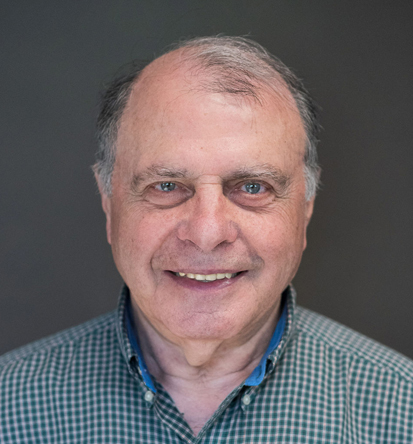Anatol G. Feldman, Ph.D.

Professor, Department of Physiology/Biomedical Engineering Institute, Université de Montréal
Researcher, CRIR–Institut universitaire sur la réadaptation en déficience physique de Montréal (IURDPM) Gingras Pavilion of the CIUSSS du Centre-Sud-de-l'Île-de-Montréal and CRIR–Jewish Rehabilitation Hospital of the CISSS de Laval
Phone: 514 340-2111 (2192)
Fax: 514 340-2154
Email: [email protected]
Education
- B.Sc., Physics, Moscow Institute of Physics and Techniques, Russia, 1963
- Ph.D., Mathematics and Physics, Moscow Institute of Physics and Techniques, Russia, 1968
- D.Sci., Neurophysiology, University of Moscow, Russia, 1980
Research interests
Mechanisms of movement control, coordination of upper limb, trunk, hemiparesis, repetitive movements, Parkinson.
Research laboratory
Sensorimotor Control and Rehabilitation Lab
Recent publications
Ilmane, N., Sangani, S. & Feldman, A.G. (2013). Corticospinal control strategies underlying voluntary and involuntary wrist movements. Behavioural Brain Research, 236(1), 350-358.
Mullick, A.A., Musampa, N.K., Feldman, A.G. & Levin, M.F.
(2013). Stretch reflex spatial threshold measure discriminates between spasticity and rigidity. Journal of Clinical Neurophysiology, 124(4), 740-751.
Ustinova, K.I., Feldman, A.G. & Levin, M.F. (2013). Bilateral coupling facilitates recovery of rhythmical movements from perturbation in healthy and post-stroke subjects. Experimental Brain Research, 227(2), 263-74.
Krasovsky, T., Baniña, M. C., Hacmon, R., Feldman, A.G., Lamontagne, A. & Levin, M.F. (2012). Stability of gait and interlimb coordination in older adults. Journal of Neurophysiology, 107(9), 2560-2569.
Feldman, A.G., Krasovsky, T., Baniña, M.C., Lamontagne, A. & Levin, M.F. (2011). Changes in the referent body location and configuration may underlie human gait, as confirmed by findings of multi-muscle activity minimizations and phase resetting. Experimental Brain Research, 201(1), 91-115.
Sangani, S.G., Raptis, H.A. & Feldman, A.G. (2011). Subthreshold corticospinal control of anticipatory actions in humans. Behavioural Brain Research, 224(1), 145-154.
Feldman, A.G. (2010). How the brain solves redundancy problems. Motor Control, 14(3), e1-e5.
Feldman, A.G. (2010). Space and time in the context of equilibrium-point theory. WIREs Cognitive Science, 1-18.
Latash, M.L., Friedman, J., Kim, S.W., Feldman, A.G. & Zatsiorsky, V.M. (2010). Prehension synergies and control with referent hand configurations. Experimental Brain Research, 202(1), 213-229.
Raptis, H., Burtet, L., Forget, R. & Feldman, A.G. (2010). Control of wrist position and muscle relaxation by shifting spatial frames of reference for motoneuronal recruitment: possible involvement of corticospinal pathways. Journal of Physiology, 588(Pt9), 1551-1570.
Yang, F. & Feldman, A.G. (2010). Reach-to-grasp movement as a minimization process. Experimental Brain Research, 201(1), 75-92.
Feldman, A.G. (2009). Origin and advances of the equilibrium-point hypothesis. In D. Sternad (Ed.), Progress in Motor Control V. A Multidisciplinary Perspective (Vol. 629, pp. 637-644). New York NY: Springer.
Feldman, A.G. (2009). New insights into action-perception coupling. Experimental Brain Research, 194(1), 39-58.
Feldman, A.G. (2009). Origin and advances of the equilibrium-point hypothesis. Advances in Experimental Medicine and Biology, 629, 637-643.
Feldman, A.G. & Levin, M.F. (2009). The equilibrium-point hypothesis – past, present and future. Advances in Experimental Medicine and Biology, 629, 699-726.
Gorniak, S.L., Feldman, A.G. & Latash, M.L. (2009). Joint coordination during bimanual transport of real and imaginary objects. Neuroscience Letters, 456(2), 80-84.
Calota, A., Feldman, A.G. & Levin, M.F. (2008). Spasticity measurement based on tonic stretch reflex threshold in stroke using a portable device. Clinical Neurophysiology, 119(10), 2329-2337.
Côté, J.N., Feldman, A.G., Mathieu, P.A. & Levin, M.F. (2008). Effects of fatigue on intermuscular coordination during repetitive hammering. Motor Control, 12(2), 79-92.
Feldman, A.G. (2008). Threshold position control signifies a common spatial frame of reference for motor action and kinesthesia. Brain Research, 75(5), 497-499.
Research orientation
Axis 1
Research topic
Research Site
CRIR - Institut universitaire sur la réadaptation en déficience physique de Montréal (IURDPM) of the CIUSSS CSMTL
CRIR – Jewish Rehabilitation Hospital of the CISSS de Laval


